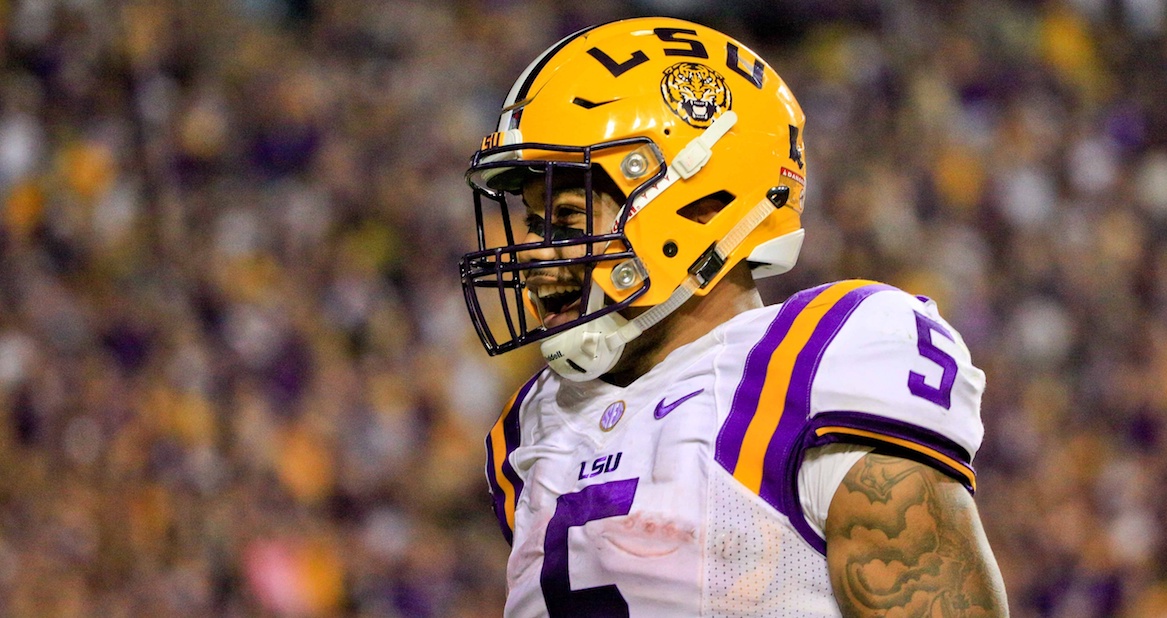
NFL Must Firmly Punish Team Who Asked RB Derrius Guice About His Sexuality
The one-on-one interviews NFL team executives conduct with prospects is one of the most crucial aspects of the Scouting Combine and the entire draft process. Like any job interview, teams are probing to test commitment, charisma, and character as it considers a vast pool of candidates. Some of the questions have been notoriously bizarre (What is bitcoin?). Others have been offensive and bordering on illegal. The latest example comes from former LSU rusher Derrius Guice at this year’s Combine.
“I go in one room, and a team will ask me do I like men, just to see my reaction,” Guice told Sirius XM Radio Wednesday. “I go in another room, they’ll try to bring up one of my family members or something and tell me, ‘Hey, I heard your mom sells herself. How do you feel about that?'”
No. No. No. No. No.
Not only is this line of questioning disgustingly inappropriate and irrelevant to the job, asking about sexual orientation in a job interview is illegal, per the EEOC (Equal Employment Opportunity Commission). While this is not an official NFL job interview in the same vein as, say, a marketing applicant, it is a job interview. It should be treated as such.
The exact questions asked of Guice have sadly come up in the recent past in the machismo culture that an NFL front office.
In 2010, then Dolphins general manager Jeff Ireland asked Dez Bryant at a pre-draft visit whether or not his mom was a prostitute. Two years ago, a Falcons assistant asked Eli Apple if he was gay. The NFL did nothing about it.
Ireland apologized but kept his job until 2014 when he was fired for football reasons. The NFL investigated the questioning of Apple and decided not to punish the Falcons. This lightweight protectionism is entirely unacceptable.
The NFL is investigating the Guice interview and there is ample reason to believe they may take this instance more seriously. They have to. “A question such as that is completely inappropriate and wholly contrary to league workplace policies,” NFL spokesman Brian McCarthy told NFL.com. Ideally the league would have the moral backbone to set the precedent that this stops now. The reality is that it cannot afford yet another public relations disaster.
The trolling questions that Guice had to field should result in the questioner being firing, the team’s banishment from the Combine the following year, and possibility a stripped draft pick. Since the reality will likely not be this drastic, the NFL has another option to prevent future disastrous questions.
Starting immediately and in conjunction with the union, adopt STRICT guidelines about the types of questions that can and cannot be asked of prospects.
Teams will still have enough free rein to ask weird questions. But under no circumstance can a team ask about sexual orientation, political views, religion, past relationships or degrade family members as a start. Violate these clear-cut rules and get punished. Add a pre-draft questioning punishment schedule in the NFL’s rulebook with hefty ramifications akin to any other ramification section of the CBA (ex. uniform fines, on field fines.) Simple as that.
Quite frankly, these absurd, probing questions have no business being part of the team interviews. The only thing a team needs to known is a player’s current character and how becoming instantly rich and/or famous may impact it either way. It’s not as if NFL front offices have collectively shown an uncanny ability to judge character. (Google “NFL” and “arrest.”). They should leave the personality evaluations to the experts.
Along those line, the NFL introduced the Player Assessment Tool (PAT) in 2013 to complement the famed Wonderlic test. While the Wonderlic tests for sheer test-taking ability, the PAT measures learning styles and mental toughness. The latter may be a useful indicator of mental strength, but if I were a team I’d enlist a professional psychologist to test for any mental illness that may have a negative impact on a team or may make a player predisposed to off-field violence. Then the team executives can spend their time with prospects by chatting about the one thing they are actually qualified to discuss – football.



